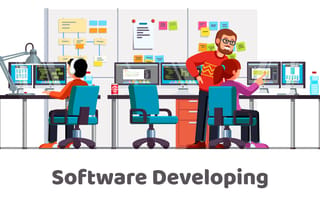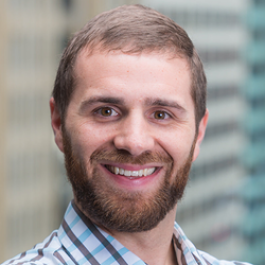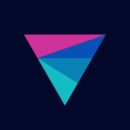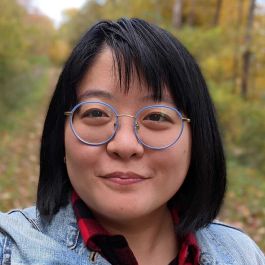These days, smartphone users aren’t merely sticking to apps like Instagram and Gmail. In fact, more are starting to make space for icons that link them to their favorite local restaurants and shops, signaling a surge in the growing accessibility of mobile apps — and the number of people trained to develop them.
An increasing number of engineers are diving into the world of mobile app development, captivated not only by its ample economic benefits but by the exciting, cutting-edge work that comes with it.
When Vivid Seats iOS Engineer Dane Thomas stepped into the mobile app development realm, the opera-singer-turned-app-developer found himself in a new space that felt both exciting and familiar.
“Learning front-end development was a sensible place for me to start because I still had a connection to an audience with my work,” Thomas said.
Currently hard at work on a new version of Vivid Seats’ iOS app, Thomas is a testament to the growing popularity of mobile app development and the opportunities it offers to those who pursue it.
Built In Chicago caught up with Thomas and another local engineer to hear about the apps they’re working on now and what they love most about the craft.
Vivid Seats offers an online marketplace where fans can purchase tickets to music, theater and sporting events across the country.
What have you found most rewarding about your current mobile app project?
The new version of Vivid Seats’ iOS app delivers an engaging, curated experience for consumers to discover live events. Aided by a robust recommendation engine, customers can utilize advanced filters and interactive venue maps to find the best seats at the best prices. With a smooth checkout process, which includes the industry’s only loyalty program, fans get the opportunity to enjoy live experiences with less hassle.
A challenging but rewarding aspect of this project has been continuing to modernize our codebases by implementing new technologies and current best practices. Fortunately, I was able to see how the codebase scaled in the past with a growing list of features while keeping up with the ever-changing techniques of iOS development. I am learning a great deal about how past developers solved complex problems and how to build a high-traffic app that performs at a high level now and well into the future.
What are some of the key technologies you're using in your current work?
If you have been in iOS development for the last two years, the newest technology everyone is talking about is Apple’s declarative UI framework, SwiftUI, and their reactive programming framework, Combine. Fortunately, Vivid Seats recognizes the importance of staying informed and up to date on any technology that can improve the quality of our app and developer experience. We explored using these technologies to see if they make sense in any of our upcoming features. Our proof of concept succeeded, and we have recently begun deploying code to production using these new frameworks.
As our app and team continues to grow, we are also focused on improving our continuous integration and delivery pipeline. Tools like fastlane and Bitrise are critical to that effort. They help us decrease the amount of time it takes to build our app and create reliable and repeatable pipelines that help us release iterative features as often as we like.
Discovering how a user wants to experience your app and delivering that is incredibly complex and fun to explore.”
What drew you to mobile app development, and how does it differ from other types of software development you’ve worked with?
The seed of my obsession with mobile development was planted upon the announcement of the first iPhone. I was studying to be an opera singer in college at the time, and I was transfixed by the keynote address introducing this new device. Once the App Store was born, I was determined to learn how to tell an iPhone what to do. Yet I didn’t act on this desire until about seven years later. Eventually, my time in the performance industry came to a logical end. Learning front-end development was a sensible place for me to start because I still had a connection to an audience with my work. Discovering how a user wants to experience your app and delivering that is incredibly complex and fun to explore.
I tried both web and mobile development, and I was attracted to mobile because I liked the idea of designing a user experience to be short and intuitive. You must find ways to compress the value of your app into brief interactions and give users reasons to come back. The new apps we are working on at Vivid Seats do just that.
Rally Health aims to make it easier for people to take charge of their health. In collaboration with health plans, providers and employers, the company offers individuals personalized, data-driven healthcare information and recommendations.
Tell us about a mobile app project you're working on right now. What about this project do you find to be most rewarding or challenging?
I'm currently working on UnitedHealthcare’s mobile application. I’m a member of the platform team for the app, which means I help maintain the framework of the app as well as the releases. Other feature teams at Rally contribute code for the features that they specialize in, which creates a really cool workflow that offers us a glimpse of the work going on across the company. There's always a lot to coordinate, from onboarding teams to maintaining standards and coordinating schedules, but it's very satisfying to get to work with so many other teams.
What are some of the key technologies you're using in your current work?
My team currently uses React Native to create the Android and iOS versions of the UHC mobile app. We dabble in the native mobile ecosystem as well, since we share some code with other apps at Rally.
I like being a part of the creativity that it takes from design, product and engineering to create a performant, intuitive app.”
How does mobile app development differ from your previous work?
Before starting at Rally, I was a full-stack web developer. Yet I've really begun to enjoy working exclusively on mobile. Mobile app development teaches you how to do more with less since you're working with a smaller device. I like being a part of the creativity that it takes from design, product and engineering to create a performant, intuitive app.









